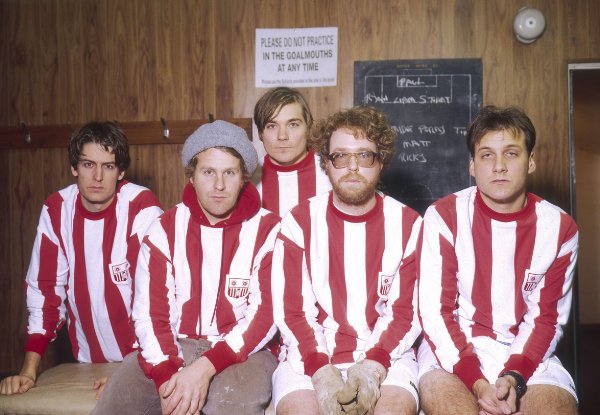So this is something which has been stewing on low heat for the best part of a decade now, but only in the last 12 to 15 months has the hot liquid of ubiquity foamed onto the stovetop of popular music. That sub-Humphrey Lyttleton metaphor concerns ‘reformation culture’, and the fact that I can write ‘reformation culture’ and be confident that the reader will know of what I speak. In other words, apologies if you arrived here Googling for the lowdown on Martin Luther’s sixteenth-century Protestant teachings, as this is about a bunch of stupid rock bands playing their stupid music, having not played their stupid music for a long time.
Circa 2010, the threshold of surprise as regards bands getting back together has never been lower, and may be essentially non-existent: it feels more of a curveball when bands actually remain defunct. When late-90s cod-Situationist Swedish hardcore band Refused had their ‘seminal’ The Shape Of Punk To Come album reissued earlier this year, their label’s website advertised it with pointed ambiguity. It was instantly assumed that this meant they were going to reform, and capitalise on their esteemed status, which mushroomed after they split. When this didn’t happen, an itchy confusion reigned on punk messageboards worldwide. Blur, Take That, The Libertines, Soundgarden, Pavement and Faith No More all played shows this year and last, having previously dissolved through the type of internal conflict that gets reported in the press, because those bands are famous. Given enough money and/or need for the same, it seems no hatchet is unburyable; Jim Morrison’s corpse, worn as a coat by Ian Astbury and others in ‘The Doors Of The 21st Century’, has demonstrated that even death is no barrier.
At this point, you’re probably thinking that this is a piece about how terrible and undignified this pervasive trend is, and that these rock dinosaurs should leave the past behind instead of tarnishing their legacy, while also being thoughtful enough to step aside and let the roost be ruled by new, young, hungry bands. That’s the party line on reformation culture, at least among those who care to give it a bit more thought than "ooh the paper said The Police are back together I used to like that song about the bottle mind you that String is a bit of a weird bugger," but it’s also WRONG! Reformation culture is a great thing which should be cheered and encouraged, basically without exception. Let me explain why.
Firstly, it is often the case that great bands reform and are great. Obviously this is kind of a no-brainer, but it bears repeating, on account of that party line I just cited. I’ve seen – to name a few, and making no apologies for reflecting my musical taste – reformed lineups of Celtic Frost, Mission Of Burma, Turbonegro and Swans totally smash it. Each of those four have also released at least one great album post-reunion; Negative Approach, The Jesus Lizard, Pentangle and Egyptian Lover (not a band, I realise) haven’t born studio fruit, but were righteous entertainment anyway.
Other times, however, great bands reform and are not great. This is rather trickier, not least because it exercises one’s emotional discipline. At a time when you, I and all of our friends are flat broke all the damn time, if I drop 20 quid on seeing The Suchandsuches play a bunch of their old records, I am GOING TO FUCKING ENJOY THIS NO MATTER WHAT because that money was for food. (This attitude, I suspect, is the unspoken factor which has rendered reformation culture especially buoyant.) Hindsight on our side, though, we can all admit to disappointments: Jane’s Addiction have contributed nothing of worth to recorded sound since 1990, Roky Erickson was barely watchable and Slint weren’t so much rubbish as playing in venues about ten times the size their uneasy and intimate music suited. I casually enjoyed Godspeed You! Black Emperor the other week, but many didn’t.
Maybe The Suchandsuches’ reunion show sucked so much it actively damaged your fandom of the group. You know what? Good. I mean, not good that you contributed towards their extortionate fee in exchange for them trashing their songs – you didn’t deserve that – but good that this amounts to an icepick into the side of ‘heritage rock’ and the canon. (Again, no apologies for focusing so strongly on rock über alles: reformation culture largely concerns guitar bands, although that’s not to say that the kind of lazy shitshows served up by, say, De La Soul or various Wu-Tang members aren’t relevant here.) When The Velvet Underground and The Sex Pistols regrouped for the money in the 90s and proceeded to piss on their chips with a series of concerts widely considered to ‘blow goats’ – as people also said in the 90s – it was a blessing in disguise. It made them seem more like humans than waxworks, and reminded the world that they were both sets of, in several cases, deeply flawed people. Ones who had a bunch of great ideas and wrote some kickass songs. Integrity is tainted, lessons are learned, idols are killed and those ancient albums still sound good – as do, incidentally, tens of thousands of other albums you’ve never heard, but are out there waiting for you to stop being such a coddled fandork and have a bit of curiosity about you.
It has long appeared to this writer that the archetypal Serious Rock Fan, who would likely be scornful of ‘manufactured’ or ‘plastic’ pop and the carpet-bomb style of marketing that fuels its existence, has a relationship with – and expectations of – his favourite musical acts which are every bit as naïve and apron string-grasping as the squealing teenage strawgirl bound up in his scorn. The pervasive notion that music fans have any right to tell musicians how and when they can perform their art is a terrible albatross around the neck of modern music, and is probably getting worse now that actually paying for a record is considered an unusual act of benevolence. Outside of the time spent performing their songs in exchange for the price of your ticket, they owe you nothing (nor you them). Yet the extent to which pop and rock musicians are expected to pander to their audiences’ whims – why aren’t you playing my town? Isn’t it about time for another album? When you break up, stay that way like all the best bands do! – is far greater than in any other artform. Granted, this is because the ‘experience’ involves going to see them live in the flesh, making it more tactile and personal, but it sometimes seems that the fan-performer duality has scarcely moved on from the early flushes of Elvismania, where rock & roll was considered entertainment and only entertainment.
Okay: dismissing intense fandom would be pretty myopic, given that it’s how a lot of people start loving music. Maybe your early teens were dominated by a New Kids or Nirvana fixation, or maybe you are one of this website’s readers not from the Western hemisphere or in your 30s. There’s probably a case to be made that this youthful ‘supporting’ of bands is a subconscious emulation of how people do the same with sports teams, or even political parties, but that’s for another day, save to say that it’s something one should grow out of, if one wishes to consider oneself a rounded appreciator of contemporary music culture. Or even a Serious Rock Fan. (Both of which are perfectly acceptable things to be, so long as you don’t describe yourself this way out loud.) If a song, a show or a whole money-grubbing reunion tour sucks, say so; if someone’s actions are beyond reproach, call them the assholes they are. Just do it with the tacit understanding that they’re not your poseable action figures.
I wonder if the broad movement further and further away from a monoculture, combined with a slow increase in John Q Public’s understanding that the music industry pays most of its participants extremely poorly, will in years to come provoke a more reasonable common view about reformation culture, and starry-eyed fandom in general. If you’re now thinking to yourself that you didn’t click on this to hear about "reasonable views", and that falling in love with music is all about unreasonable bias and unrealistic expectations… well, sorry to go Buzz Killington on you, but it’s a load of Nick Hornby bollocks. It’s entirely possible to have an intense love of a band’s music, image and ethos, follow them on tour, queue to get their bloody autographs if you must, and still allow them the moral right to do as they wish. Up to and including not being a band any more, or pinpricking the good times you had by playing some gigs when they fancy it again.
It’s also possible, and here’s where we tackle the grubby and not yet invoked spectre of bands reforming who sucked in the first place, to escape almost any given cultural ‘happening’ in 2010 – or at least close your ears to it. In the interests of honesty, I’ll cop to being lucky in this regard, insofar as my job lets me listen to CDs instead of the radio, read news on the internet, and doesn’t have too dominant a watercooler-chatter element. And sure, the Royal wedding is doubtless gonna let a bunch of newjacks and goldfish-memory types know what media saturation is actually like – but anyone who described the news of, say, the Pavement reunion as "inescapable" is either a hyperbolic twerp or needs to tell their friends when to shut up.
If you don’t care, ignore everyone who does and use your resultant free time to discover something – a band you slept on, an animated GIF, an exciting biscuit – worthy of your fuelled passion. In this way humanity will advance as a species and by 2016 I will be standing next to you in the queue for the long-awaited reunion gig by Taint (a South Wales metal band whose last show I just happened to see last night as I type, and who I already want to see again), discussing cultural theory while only using acronyms. It will be art and entertainment.



